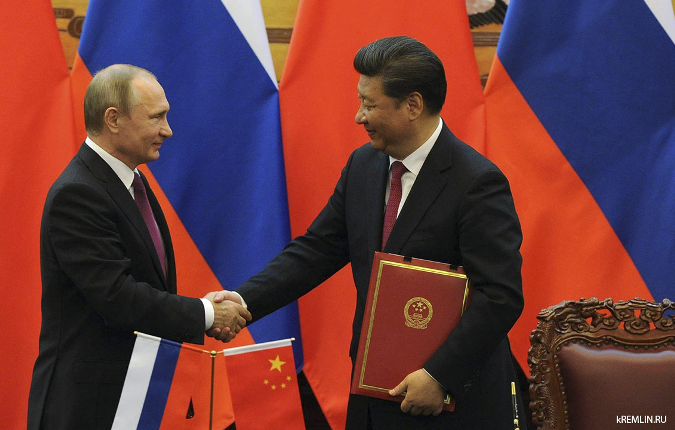|
|
Putin and Xi Stress World Importance of Their ’Major Power Relationship’
26 June 2016
The Presidents of Russia and China, Vladimir Putin and Xi Jinping, met in Beijing on Saturday, and issued three major statements of great import regarding their relationship and the world strategic situation. This is Putin’s 15th visit to Beijing, and his opening comments to Xi before their meeting underscored the depth of the two countries’ alliance: "We meet often and on a regular basis, but ... each of our meetings is always substantive in nature.... Life itself demands that our peoples work to strengthen and develop our relations." President Xi, for his part, commented after their meeting: "The more difficult the international situation gets, the more decisively we must be guided by the spirit of the strategic cooperation, friendship; we should enhance bilateral support, strengthen political and strategic cooperation, deepen our relations." The first, rather lengthy joint statement that they issued stresses the importance of their relationship as a model of a "major power relationship" which they consider the model to be followed in what has now become a multi-polar world. The document also goes on to emphasize the significance of their model of relationship, including its respect for each nation’s particular road of development and the doctrine of non-interference in the internal affairs of the other, as a new model for interactions in a world characterized by conflict. The document also underlines their increased cooperation in the "nuclear arena" as well as in the area of space, including cooperation in lunar exploration. It also underlines the complementarity of the two nations’ development projects, in particular between the development of the Russian Far East and of the Chinese northeastern provinces bordering Russia, as well as complementarity between the development of the Russia’s Volga region and the Yangtze Development Zone. It further stresses the importance of their relationship for stability in the world arena. The main document highlights the new volatility on the financial markets, aggravated by the "unilateral sanctions" imposed by certain countries. It also throws down the gauntlet to the hegemonic aspirations of "certain countries" and "certain military alliances" which threaten the world’s stability by their aspiration to maintain unilateral military superiority at the expense of other countries’ ability to defend themselves. It hearkens back to the original intent of the United Nations to prevent war and establish an international system of law to which all countries should adhere. China and Russia also affirmed their intention to work together at the UN to prevent unlawful and unauthorized military interventions that are not under a UN mandate. The document points to the importance of the BRICS group as well as the function of the ASEAN and ASEAN-plus groupings for the global economy. The two issued a second, specific statement regarding the global threats created by "certain countries" pushing to increase military tensions in the world. The document denounces the destabilizing nature of the missile defense plans in Europe, as well as the envisioned THAAD deployment in the Asia-Pacific. A third agreement was signed on cooperation on cyber-security. Additionally, over 30 economic agreements were signed during Putin’s visit, particularly in the sphere of energy, agriculture, transportation, aerospace and military technical cooperation. See also: 16th Shanghai Cooperation Organization Summit Highlights Russian, Chinese Leadership SCO Tashkent Declaration Warns: ’Geopolitical Tensions,’ Terrorism Threaten Human Civilization |


